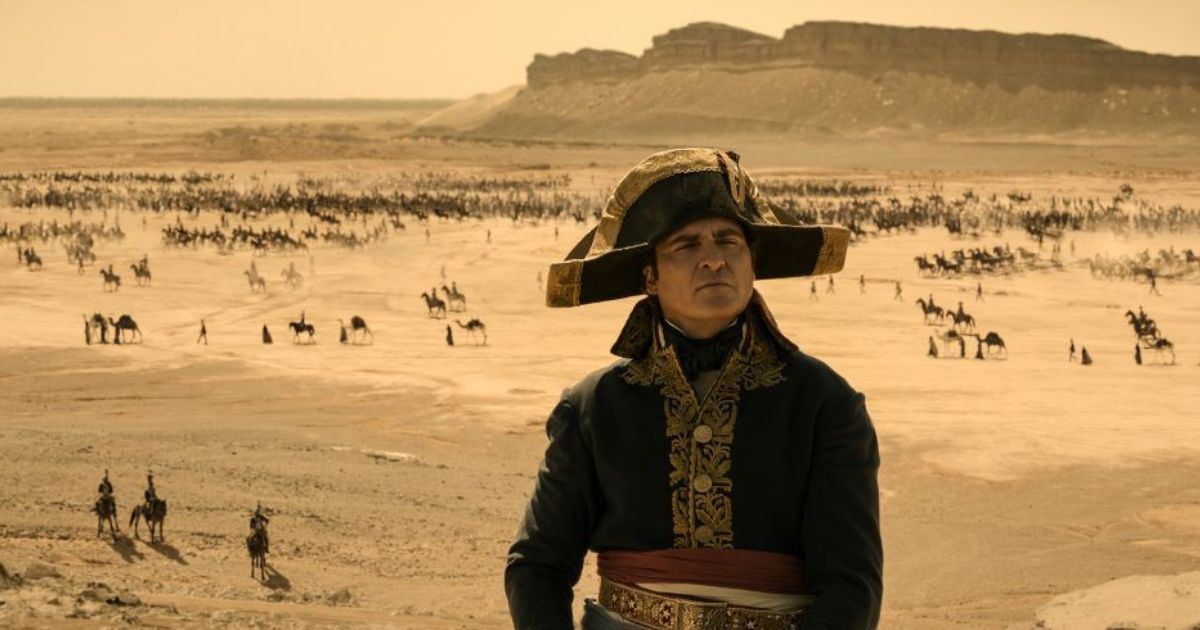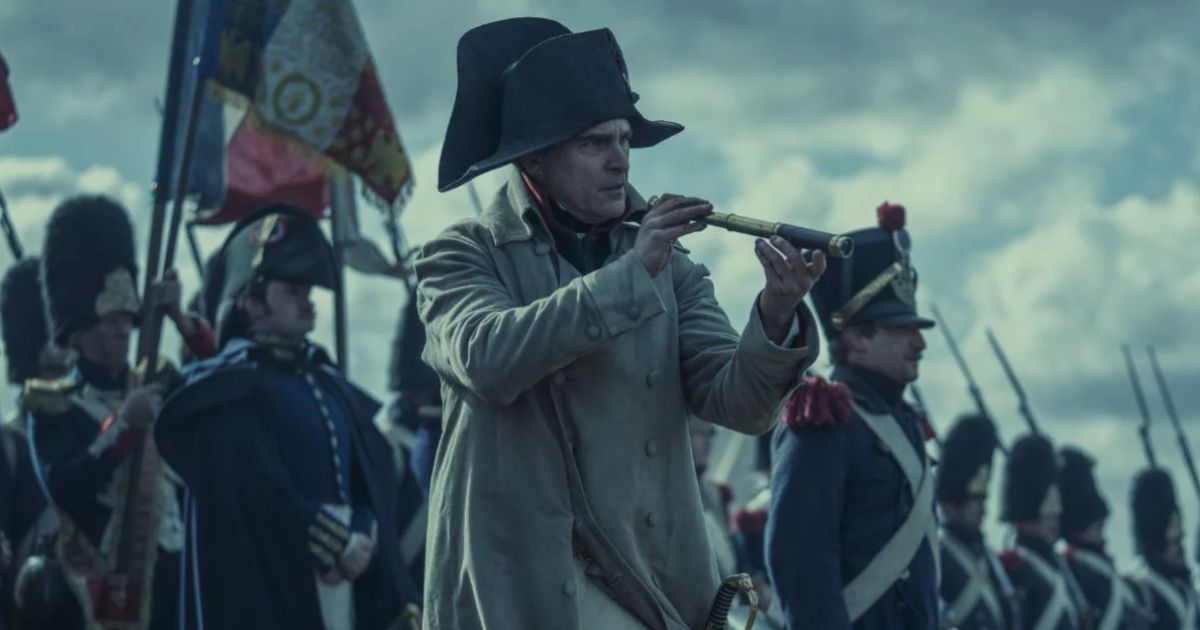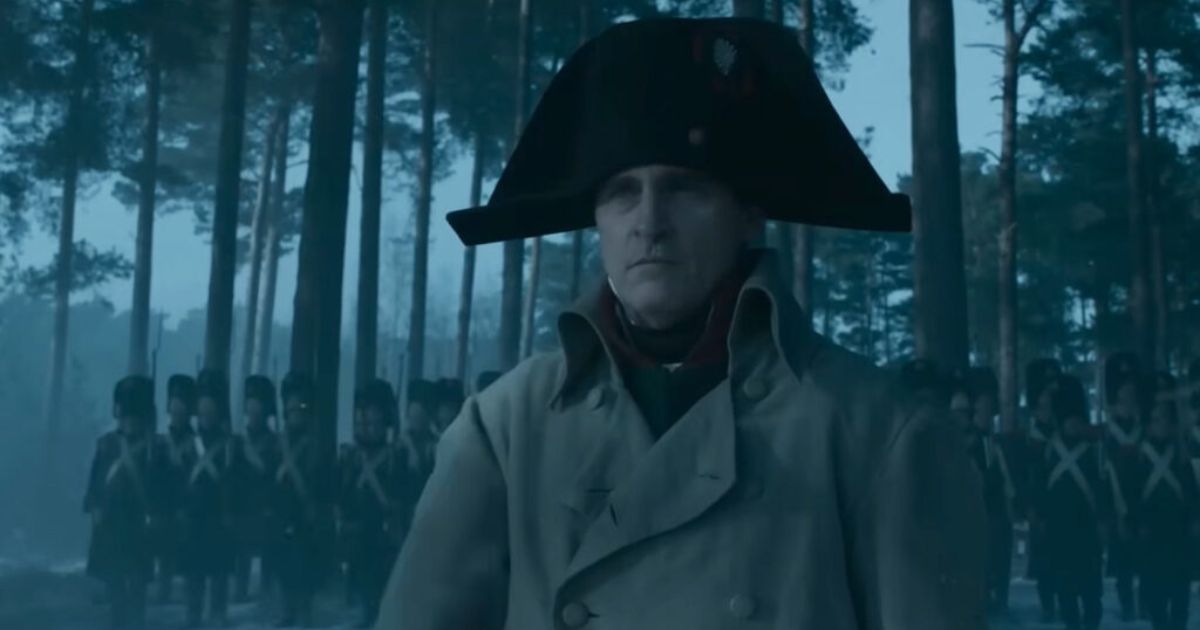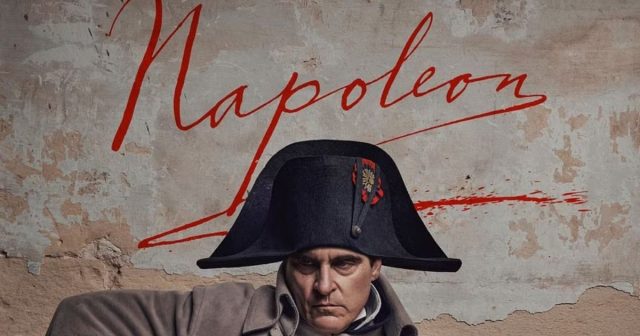Ridley Scott’s Napoleon is a massive, visually stunning epic that pulls you straight into the chaos and grandeur of late 18th and early 19th-century Europe. Joaquin Phoenix gives a career-defining performance as Napoleon Bonaparte, showing both his ambition and his human vulnerability. Florence Pugh is equally captivating as Joséphine de Beauharnais, adding warmth and complexity to the story. The film is long—over three hours—but every minute is packed with something to marvel at, from sweeping battle scenes to quiet, intimate character moments. With breathtaking cinematography by Dariusz Wolski, meticulous costume design by Janty Yates, and a stirring musical score, Scott creates a world that feels alive. In this Napoleon movie review, we’ll delve into how the film strikes a balance between epic spectacle and personal storytelling, making it a must-watch for fans of historical dramas.
Plot Summary

The film opens on Corsica, where a young Napoleon (Joaquin Phoenix) chafes under his father’s stern guidance and the island’s political turbulence. Determined to carve his own path, he enrolls in the French artillery academy, where his brilliance and ambition begin to shine. After a passionate courtship with Joséphine (Florence Pugh), Napoleon finds himself navigating Paris’s shifting allegiances during the Revolution. Key victories at Toulon and Arcole establish his reputation, while his strategic genius becomes undeniable. However, personal and political betrayals test his resolve, setting the stage for his coronation as Emperor in 1804. The film crescendos with monumental battle sequences—Austerlitz, Jena, and beyond—interwoven with tender moments between Napoleon and Joséphine. As the tides of war shift, Napoleon captures both the exhilaration of conquest and the heartbreak of loss, culminating in the famed retreat from Russia and the ultimate fall from power.
Cast & Performances

Joaquin Phoenix delivers a career-defining performance, inhabiting Napoleon’s intensity and vulnerability with equal conviction. His gaunt frame, clipped accent, and piercing gaze convey a man consumed by destiny. Opposite him, Florence Pugh imbues Joséphine with charm, wit, and a fierce emotional core, making their relationship the film’s heart. Supporting performances—Ben Miles as Paul Barras, Vanessa Kirby as the Duchess of Richmond, and Tahar Rahim as General Junot—add depth to the political intrigues. Each actor feels fully realized, elevating the sprawling narrative and grounding the grand spectacle in human emotion. The chemistry between Phoenix and Pugh anchors the story, ensuring that the film’s intimate moments resonate amid the sweeping war sequences.
Direction & Cinematography

Ridley Scott proves once again why he’s a master of large-scale filmmaking. His direction balances vast panoramas with close-up emotional beats, creating a dynamic rhythm that sustains interest across three hours. Cinematographer Dariusz Wolski captures battlefield chaos in visceral detail—mud-splattered infantry, soaring cavalry charges, and thunderous cannon fire—while also framing quieter sequences in opulent palace chambers and candlelit drawing rooms. Use of natural light and practical effects lends authenticity, while sweeping drone shots and meticulous camera moves underscore the story’s epic scope. Scott’s vision is both grandiose and intimate, inviting viewers to witness history up close and from afar.
Production Design & Visual Effects
The production design team crafts a vivid window into Napoleonic Europe, from the dusty artillery yards of Toulon to the gilded salons of Paris. Costumes range from battered soldier uniforms to ornate court attire, each piece reflecting social rank and character psychology. Large-scale sets—complete with hundreds of extras—immerse the viewer in military campaigns, while digital extensions seamlessly expand the world without drawing attention to CGI. The filmmakers strike a careful balance between practical effects and visual artistry, ensuring that explosions, smoke, and artillery barrages remain gritty and tactile rather than overly stylized.
Musical Score
Composer Martin Phipps delivers a rousing, emotionally resonant score that underscores the film’s shifting tones. Martial drums and sweeping strings accompany battle scenes, propelling the action forward, while softer woodwinds and pianos highlight moments of introspection and romance. The music never overpowers the drama; instead, it weaves organically through the narrative, enhancing the emotional stakes. Key themes for Napoleon and Joséphine recur throughout, creating a cohesive musical tapestry that binds the epic together.
Historical Context & Accuracy
While Napoleon takes certain dramatic liberties—condensing timelines and merging minor historical figures—it remains faithful primarily to documented events. The film’s consultants ensured that battle tactics, political maneuvers, and interpersonal dynamics reflect contemporary scholarship. Scott doesn’t shy away from exposing the darker aspects of Napoleon’s campaigns—civilian casualties, harsh winter retreats, and the emperor’s ruthless decisions—offering a balanced portrayal rather than hagiography. Viewers interested in history will appreciate the meticulous attention to period detail and the film’s willingness to engage with the complexities of its subject.
Themes & Motifs
At its core, Napoleon examines the duality of ambition and love. Scott explores how the drive for power can both uplift and destroy, and how personal relationships can fuel or fracture great destinies. The recurring motif of fire—flaming cannons, torched villages, hearth fires in countryside homes—symbolizes both destruction and renewal. The film also grapples with questions of legacy: what is a man willing to sacrifice for greatness, and at what cost does history crown its heroes? These thematic layers enrich the narrative, inviting repeated viewings and deeper analysis.
Pace & Editing
Editors Pietro Scalia and Joy Kecken maintain a brisk yet thoughtful pace, ensuring that the film’s three-hour runtime never feels tedious. Battle scenes are intercut with political dialogue and intimate character exchanges, providing necessary rhythm and preventing visual fatigue. Transitional sequences—depicting marches across the French countryside or shipping lines to Russia—use time lapses and montages to keep momentum while conveying the passage of years. Though some viewers may find the runtime daunting, the dynamic editing sustains narrative drive from start to finish.
Verdict
Napoleon stands as a monumental achievement in historical filmmaking. Anchored by powerhouse performances from Joaquin Phoenix and Florence Pugh, and guided by Ridley Scott’s visionary direction, the film offers an immersive journey through ambition, warfare, and love. While its length and occasional narrative compression may challenge casual viewers, history enthusiasts and epic-film fans will find much to admire—from the gritty authenticity of its battle scenes to the emotional depth of its central romance. Napoleon earns a strong 4.5 out of 5 stars for its scale, artistry, and heartfelt interrogation of power’s allure.
For Further Reading, explore John Wick: Chapter 4 Movie Review – Keanu Reeves Delivers an Unforgettable Action Epic









